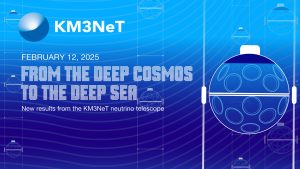Paschal Coyle and Claudio Kopper elected co-chairs of the GNN board
11 September 2025 – Stronger together!
Paschal Coyle (CPPM, Marseille) and Claudio Kopper (ECAP, Erlangen) are the new chairs of the Global Neutrino Network (GNN).
Read more
Posts about issues important for the KM3NeT collaboration such as collaboration meetings, social events, new member-institutes, new funding etc.
11 September 2025 – Stronger together!
Paschal Coyle (CPPM, Marseille) and Claudio Kopper (ECAP, Erlangen) are the new chairs of the Global Neutrino Network (GNN).
Read more
28 July 2025 – On behalf of the collaborations, ANTARES and KM3NeT scientists presented their latest results at the International Cosmic Ray Conference. Read more
20 July 2025 – We are very proud of Nadja Lessing, PhD student at the University of Valencia, who won a poster prize of the European Physical Society at the Majorana School 2025 in Modica, Sicily (Italy). Congratulations, Nadja!
18 July 2025 – Last week, leading particle physicists gathered for the “EPS-HEP” biennial conference. This meeting, held by the High-Energy Physics division of the European Physical Society (EPS), is one of the biggest particle physics conferences in Europe. Read more
20 June 2025 – A very important step forward for KM3NeT has been accomplished this week by establishing the KM3NeT AISBL!
27 May 2025 – Do you know how the optical modules of KM3NeT are built? This has been shown and practised in the second edition of the Digital Optical Module (DOM) integration workshop which took place last week.
14 May 2025 – Today the new facilities of the CAPACITY laboratory in Caserta have been inaugurated.
18 April 2025 – The third KM3NeT Town Hall Meeting took place in the School of Physics of Les Houches, close to Chamonix (France), in front of the Mont Blanc, from 13th to 18th April 2025.

5 February 2025 – We have exciting news to report!
Please join us Wednesday, 12 February at 4:50 p.m. CET to know more.
The webinar will be streamed on the KM3NeT YouTube channel: https://www.youtube.com/live/2jgyZlBpkl8?si=qSwkKHynETOZ_xbA
Additional information can be found here.